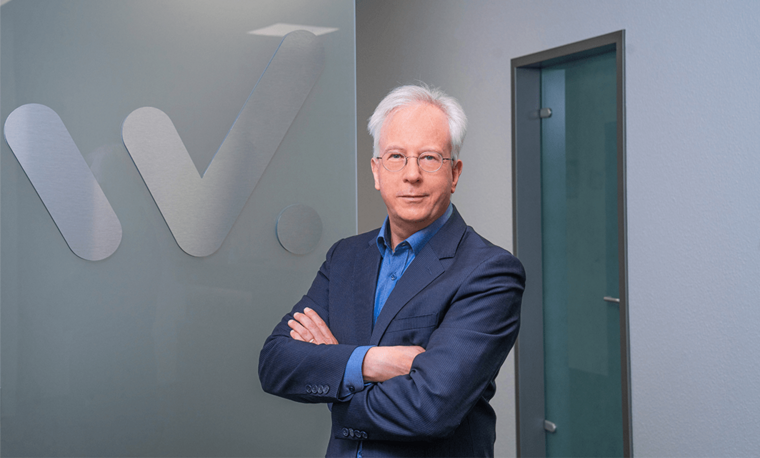"You don't want to lock up a racehorse...?
Great interview with our CEO Roger David
Exactly 20 years ago, Roger David launched windream GmbH. Since then, the software house with its headquarters in Bochum has become one of the leading providers of ECM-solutions and offers its channel partners and customers sophisticated solutions for the digitalisation of their document processes. We met David in Bochum in mid-June, and he took us on an entertaining journey through two decades of windream. The journey ranged from Excel spreadsheets on weekends to the triple wrong timing when founding a company, to baby rattles in customer presentations and the decisive difference between BioNTech and Pfizer. But read for yourself.
The first three years were really hard and required a lot from us: It also involved pain and cost me and my team a lot of heart and soul.
We started with a four-person management team, in which the central strategic columns of windream GmbH were each assigned to one person: Edwin Sembritzki was responsible for partner sales, Werner Schlieper for the integration partners, Dirk Kimmeskamp was in charge of finances, and my area was direct sales. Later, Jörg Dickmann joined us and took care of consulting to complete the management quintet.
My weekends at that time were always dominated by examining the current figures in Excel on a weekly basis. Every month, we stood in front of the employees as a management team and explained the company's development in all transparency. Initially, we did this on a monthly basis, but later we switched to a quarterly cycle.
Surely not. We usually make majority decisions: Three votes are enough, even if I disagree. It has always been very important to me that we make fact-based decisions: Yes, there are tough arguments and fights - but that's a good thing.
My motto for managing the company is: Divide et impera - divide and rule! (laughs) "In the literal sense, of course, and not in the historical sense.") 'Ordre du mufti' is not really my thing...

The company in Bochum was and still is especially proud of the seamless integration of the windream ECM-solution into the Windows operating system. If Bill Gates already causes nightmares for many users, you at least wanted to make sure that IT managers have carefree dreams thanks to windream - at least this is how the journalist imagines the naming. What is so special about this approach?
Normally, ECM is a normal application alongside the business applications and office products. In order to take advantage of the numerous benefits of structured document management, users usually have to change completely, since documents first have to be taken out of the ECM and transferred to the specialist application. After a change has been made, the document must then be transferred back into the ECM. This process is called check-out and check-in, and users are not enthusiastic about it if it is not done automatically.
Then, we had the brilliant idea: Why don't we simply make the windream repository a Windows drive? This was the birth of the VFS-technology (Virtual File System). And it was the best idea since the invention of sliced bread. This ingenious product idea was also the origin for the foundation of windream GmbH.
Thus, we had the users on our side from the very beginning - and it is still the case today that users are enthusiastic when they are presented with our product concept. At that time, at the beginning of the 2000s, the IT-specialists were still the "masters" in the companies, according to the saying: "Only we are allowed to push buttons on the computer! The experts ." In contrast, our goal from the very beginning was to take the users along with us and make document management as easy as possible for them. This has turned out to be the case.
With the new windream Dynamic Workspace, we have now - 20 years later - set such a milestone again!

At the beginning of the 2000s, the IT industry was floating in completely different spheres; CeBIT alone attracted more than 800,000 people to the traditional spring awakening in Lower Saxony's pretty state metropolis of Hanover in its record year of 2001. As a software provider, was it even possible to fail so many things at once back then that you still wouldn't have been somewhere at the top of the digital wave...?
I see it completely differently! In 2000, as you know, there was a huge Internet hype: either you spoke Web, or you were irrelevant. Then this gigantic bubble burst overnight, and the new market was dead from one day to the next. Even the global financial crisis of 2008 didn't give us such a massive downturn as the bursting of the Internet bubble in 2001. In the course of this, some ECM providers - quite well-known ones - also had to pull up stakes...
And then there was 9/11 with all the well-known consequences.
Conclusion: 2001 was anything but a good founding year! Everyone was totally disillusioned and very cautious - and founding a software company was really like riding on a razor blade.
In fact, it has always been my desire to start my own company. I've been working towards it constantly: After studying computer science, I first gained practical experience in a small company where everyone had to - or better - could do practically everything. That was a good school for me.
At that time, the statement of a friend who said to me: "There is never the right time for the leap into self-employment: Either you dare to do it, or you don't! So I founded my company - exactly between the birth of my son and my daughter. I could hardly have chosen a better time...
CeBIT back then was brutal. I can still remember that I wore out two pairs of shoes at my 'worst' CeBIT...
But what really made CeBIT such a success? Just the concentration of so much technology in such a small space? No. I think that the secret of success lay in the unusual combination of consumer and B2B trade fair. Year after year, B2B suppliers have complained about the hordes of 'hunters and collectors' clogging up their booths - but at the same time, the gentlemen in their gray suits were regularly drawn to the halls where the lights were flashing and the latest game consoles were presented.
Therefore, in my opinion, it was extremely unwise to focus only on B2B business in Hanover: The CE suppliers then quickly migrated to Las Vegas, the mobile phone industry to Barcelona, and so on. What remained were only the B2B topics, which ultimately made the trade show dull and boring.
Our solutions have become increasingly complex, and selling B2B products is indeed complex. CeBIT provided an ideal platform for decision-makers who wanted to find out all about the latest ECM offerings: Such a concentration of suppliers in a confined space can only be found at trade fairs. That is definitely missing!
Try asking our colleagues in sales what they think of MS Teams presentations in which they alternately hear the baby rattle, a rattling coffee machine or the television in the background - but speak into the void themselves. It is sheer horror! Interaction turns into one-way communication, and social contact completely falls by the wayside.
Of course, there are arguments in favor of digital formats: They are convenient and low-threshold for participants, and the time and cost involved is also much lower for everyone involved. In this respect, both formats certainly have their justification. But I am convinced that trade shows will experience a renaissance once the Corona pandemic is completely a thing of the past.
Not a second! I am a computer scientist with all my heart and want to make a difference - you don't want to lock up a racehorse...?
If you question yourself as a company founder in this way, you won't make it either. In 2001, after the dotcom bubble burst, so many people told me: " You can forget about the company, it's not going to work out. Nevertheless, I firmly believed in my idea and the company.
(laughs) My children! In 1999 my son was born, in 2001 my daughter. I built up the company during that exact time: So that was triple wrong timing...It still worked out well because I have a wife who was and continues to be fully behind me.
In business, the GDPR cost me a lot of nerves: Diffuse fears were stirred up without any reasonable explanation. Basically, the regulation was clearly aimed at the big tech companies and not at small and medium-sized enterprises. It was a huge job-creation measure that often ended up hitting the wrong people.
That's what I thought when I first got involved with the topic. Document archiving is dry as dust - that was my impression at the time.
However, the deeper I delved into the subject, the more exciting I found it: I suddenly realized that an ECM solution can improve business processes. What's more, over the past 20 years I've gotten to know so many exciting companies from very different industries - it's been anything but boring.
I would be less cautious about some decisions. Let's take a look at the stock market crash in March 2020, after it became clear that Corona would develop into a global pandemic: That's when we made a conscious decision to buck the trend and invest countercyclically: We expanded our sales team, invested in our own video room with state-of-the-art technology, etc. And it worked. We could have done the same thing in 2008 during the financial crisis.
I am especially proud of the fact that windream GmbH has not needed a single euro of credit from its foundation in November 2001 until today!

On the one hand, this is due to the proverbial German thoroughness. On the other hand, Germany was and is traditionally a high-tech country: German engineers stand for excellent technologies and the highest quality standards worldwide. This also applies to the development of software solutions and thus to the ECM industry.
On the other hand, we are also known for 'monstrous' developments such as DOMEA - a regulatory behemoth that filled what felt like twelve binders with what ECM software must be able to do. Even saying the long version of DOMEA - document management and electronic archiving in the IT-supported business process - borders on bodily harm...
How can the country of poets, thinkers and ponderers move away from the mere administration of former top performances and into a new culture of courageous, proactive action? Does Mrs. Merkel know that you can't defend a World Cup soccer title, let alone manage it, but at best win it twice? Russia 2018 is the best proof of this...
I see it completely differently: What distinguishes the Germans is that they grab hold and pull themselves out of the mire again and again by their own bootstraps. There are so many courageous entrepreneurs who move forward with passion and a positive spirit. That's the great strength of our country: the small and medium-sized businesses that keep coming up with new ideas and business models and thus lay the foundation for our prosperity. Basically, corporations like Pfizer know very well that they need the innovative strength of medium-sized companies like BioNTech - which is why the cooperation on the Corona vaccine development came about.

Stay up-to-date: Get news about promotions and events as well as interesting facts about digital document and process management in our monthly newsletter.
Subscribe now


